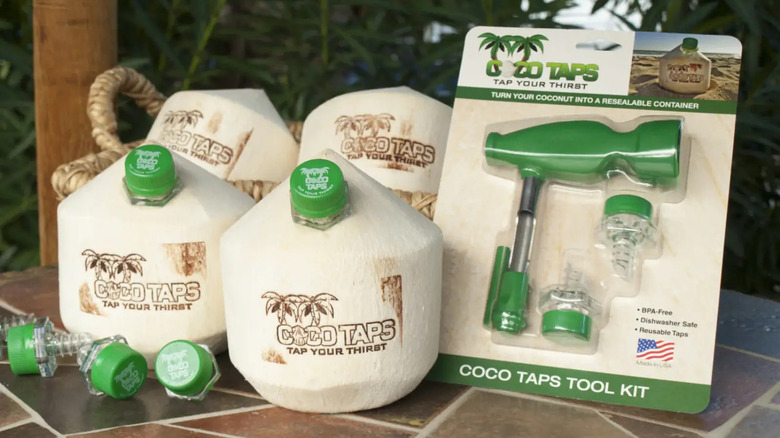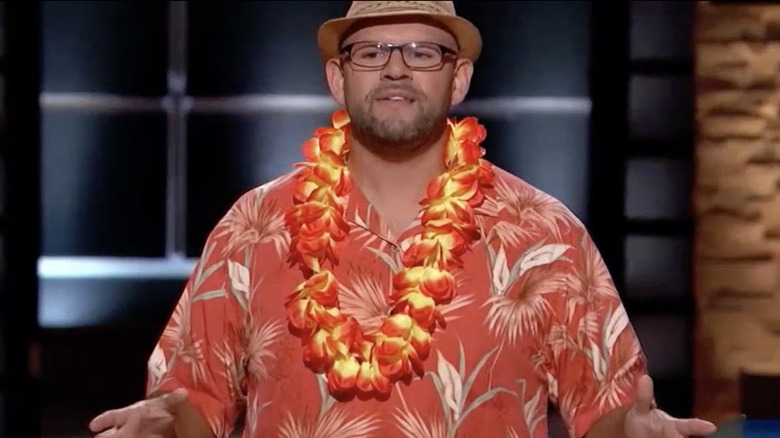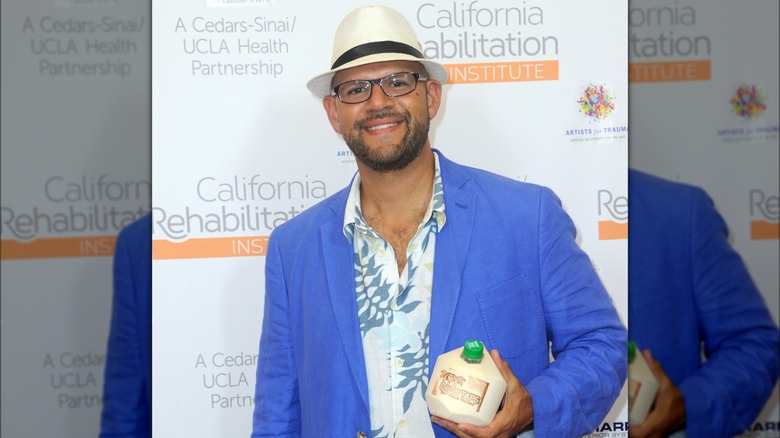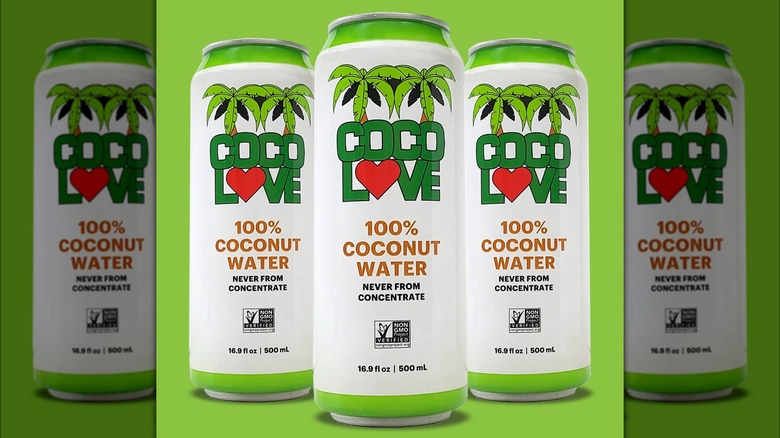CocoTaps: Here's What Happened After Shark Tank
If you've ever had fresh coconut water, you know it tastes noticeably different from the packaged kind. Vincent Zaldivar (nicknamed CocoVinny) knows this well, as he initially thought he disliked coconut water until he tasted the fresh kind. He found the flavor to be unmatched by boxed and bottled versions, which he thought were stale-tasting. The straight-from-the-fruit variety tastes slightly sweet and nutty, and Zaldivar wanted to make that accessible for the masses. This is where the idea for the company CocoTaps was born.
Zaldivar invented a coconut "tap" so you can partake in this delicious drink in the freshest way possible. Since opening a coconut proves to be a tough or even dangerous job, CocoTaps offers a way to quickly and safely drill a hole into the fruit, then screw on a reusable cap so it can be enjoyed for weeks. All you have to do is take the tapper, remove the safety cover, and twist it back and forth into the shell. Once you've punctured the coconut, you screw on the cap that allows you to take a chug right from the fruit, for an unparalleled tropical beverage.
Zaldivar spent two years developing the original CocoTaps Tool Kit, and decided to seek outside investors on "Shark Tank" to really get his business off the ground. But did any of the Sharks go coco-nutty for the product on its 2017 episode, or did Zaldivar walk away empty-handed?
What happened to CocoTaps on Shark Tank?
CocoTaps owner Vincent Zaldivar confidently strutted into the tank on Episode 12 of Season 9, playing a ukelele and singing a song that said coconut water has "got to be fresh right from the tree," among other entertaining lyrics. After his introduction, he expressed his desire for an investment of $150,000 in exchange for a 10% stake in his company. Along with his innovative coconut tap, Zaldivar delivered pre-tapped and branded coconuts to big-name Vegas resorts and cruise ships. Another selling point: His drinkable coconuts are sustainable and long-lasting, so instead of wondering how long your coconut water lasts, you know your tapped fruits will keep for up to four weeks when refrigerated.
Zaldivar continued by giving each Shark their own tapped coconut and demonstrating how the tapper works. Barbara Corcoran quickly asked about sales, to which Zaldivar responded that CocoTaps made $250,000 in revenue in its first year, and was on track to double the next year. However, he admitted that his pre-tapped coconuts made up more sales than the tapper itself. Zaldivar's explanation of his business plans and vision was also too confusing for the judges.
This was a breaking point for Mark Cuban, who felt that CocoTaps was more of a delivery service that seemed difficult to expand on, causing him to drop out first, followed by Corcoran, Robert Herjavec, Rohan Oza, and Lori Greiner. While coconut water might be the hydration powerhouse of our dreams, that ultimately wasn't enough to sway the investors, and Zaldivar left the tank with no deal.
CocoTaps after Shark Tank
Leaving "Shark Tank" without a deal from the investors can get anyone's hopes down. However, that didn't stop the CocoTaps owner from continuing his mission to spread freshly-tapped coconuts throughout the Las Vegas area. With the airing of his "Shark Tank" episode, Vincent Zaldivar was able to bring more publicity to his company. He even appeared on Las Vegas news outlet KTNV Channel 13, with the headline "Denied on Shark Tank but pursued dream anyway."
During the segment, Vegas resident CocoVinny spoke of how he cried after not finding success on the show, but quickly realized that "every setback is a setup for a comeback." Undeniably, this entrepreneurial spirit is what kept things alive. Even after losing out on a deal, Zaldivar did not compromise on his values, prioritizing CocoTaps as a zero-waste company.
In addition to offering its original tool kit, CocoTaps continued selling from its Las Vegas warehouse, filling local stores, popular resorts, and even the pool club at the Palms Casino Resort with its freshly-tapped, branded coconuts. Zaldivar's long-term vision was to eventually own thousands of acres of coconut trees, to continue his mission to provide sustainable coconut water for all.
What's next for CocoTaps?
CocoTaps has stayed in business as of this writing. The original tappers and reusable lids are still available for purchase from the company's website, plus other sellers like Amazon. You can also buy the brand's pre-tapped coconuts at several spots on the Vegas Strip, including places like Bellagio, Park MGM, Mandalay Bay Beach, and MGM Grand Resort.
Vincent Zalvidar now also runs CocoLove, which is a canned coconut water company. CocoLove donates a portion of its profits to plant a coconut tree for every can sold, working with the nonprofit Roots for Change. Additionally, the brand uses recycled cans. While freshly-tapped coconuts may taste better, it's much easier to pour from a can when splashing coconut water into your smoothies. CocoVinny seemed to be on the same plane of thinking, as CocoLove's products might have broader appeal over his CocoTap device.
CocoLove beverages are also non-GMO, kosher, gluten-free, vegan, and preservative-free with no added sugar. While there's no definitive indication of what's next for CocoTaps, it's apparent that this new vision aligns with its goal to offer tasty, eco-friendly coconut water that gives back to the earth that grows this delicious drink.




